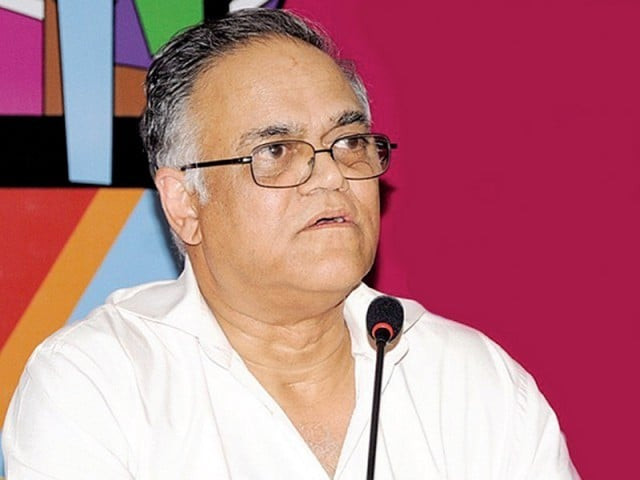‘Pakistan-India relations complex but not insurmountable’
Javed Jabbar speaks on the strained relationship between the two countries

Former Federal Minister Javed Jabbar. PHOTO: FILE
He was invited to deliver a lecture on 'Pak India Relations: Issues and Prospects' at the Arts Auditorium. The talk was organised by Prof Dr Moonis Ahmer, dean of the faculty of social sciences, under the Distinguished Lecture Series on Thursday.
Pak-India relations — is there a way forward?
The talk mainly focused on the problems, similarities and steps the neighbouring countries should take to make the things better between the two countries. "The situation will never get better and the problems will not be solved until the countries come to an understanding and the younger generation takes steps to make things better," said Dr Ahmer, explaining why he arranged the lecture.
As a former student of the international relations department, Jabbar expressed his happiness at being asked to come back and deliver a lecture to the current students.
"There is a long list of formal issues that India and Pakistan are suffering from," he said, sharing a Power Point slide mentioning issues such as Kashmir, LoC, hate speeches and cricket.
LUMS professor gains internet stardom following hilarious note for students
The former minister made four points to cover all the issues he listed in his presentation, giving a brief explanation of the problems.
Firstly, he spoke on state dualities and societal pluralities, which he explained as formal and state-to-state relations, while official but covert activities of intelligence agencies also take place on the side. "By mentioning societal pluralities, we have social, cultural, religious, linguistic and ethnic pluralism in both the countries," he added.
Explaining the political representation in both countries, he shared that Indian Prime Minister Narendra Modi's Bharatiya Janata Party (BJP) has only secured 21 per cent of the votes, but still they manage to rule the whole country. Explaining how these numbers make a difference, he explained how a majority of Indians did not vote for the BJP and there are millions of people who do not hate Muslims, as we are led to believe.
India-Pakistan relations on slippery slope
Moving onto his second theory of asymmetry and symmetry, he discussed the similarities and differences between Pakistan and India. Comparison of the two countries is not possible at all, as India is six times bigger than Pakistan in terms of population, coastline and economy, he reasoned. Discussing the similarities, he shared that both the countries have two distinct identities, which were born together but are evolving nations.
Explaining his third perspective, Jabbar said that there are some issues, which need to be resolved through bilateralism and some needs multilateralism. "India says the Kashmir issue is a bilateral issue and the Shimla Agreement was misrepresented in this regard," he said, adding that many countries have tried to mediate on the Kashmir Issue.
His fourth perspective focused on dominance and equality. Jabbar said that throughout the world every big country tries to dominate neighbouring countries, it is the same issue with India.
Indo-Pak relations: ‘Let’s re-write our history for a better future’
Elobarting some points to the students to make relations better in the future in an interactive session, he said that a third party should monitor the conflicts on the LoC and cross borders issues. Both countries have to resolve their common issues of health, education and corruption despite fighting each other.
Concluding his lecture, Jabbar said that there is tension between India and Pakistan but people should not convert that tension into violence.
Published in The Express Tribune, October 30th, 2015.



















COMMENTS
Comments are moderated and generally will be posted if they are on-topic and not abusive.
For more information, please see our Comments FAQ